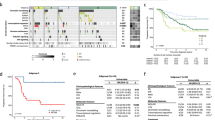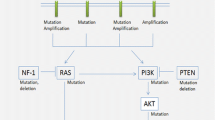Abstract
The stem cell factor/kit tyrosine kinase receptor pathway is related to tumor growth and progression in several cancers including Ewing sarcoma, a peripheral PNET (pPNET). Identifying additional groups of tumors that may use the pathway is important as they might be responsive to imatinib mesylate treatment. MB and central PNET (cPNET) are embryonal tumors of the CNS that share similar undifferentiated morphology with Ewing sarcomas and display aggressive clinical behavior. cPNET outcome is significantly lower than MB outcome, even for localized tumors treated with high-risk MB therapy. The elucidation of signaling pathways involved in MB and cPNET pathogenesis, and the discovery of new therapeutic targets is necessary to improve the treatment of these neoplasms. We analyzed KIT expression in 2 MB, one pPNET, one cPNET and 2 rhabdomyosarcoma (RMS) cell lines. Also, in 13 tumor samples (12 MB and one cPNET), we found KIT overexpression in the most aggressive cell lines (metastatic MB and pPNET). Hypermethylation of KIT was clear in the RMS non-expressing cell lines. Among MB tumors, we could see variable levels of KIT expression; a subset of them (25%) might be related in its growth pattern to KIT up-regulation. No methylated KIT was detected in the tumors expressing the lowest levels of KIT. Our results point to methylation as an epigenetic regulatory mechanism for KIT inhibition only in the KIT non-expressing RMS cell lines, and neither in the rest of the cell lines nor in the tumor samples.





Similar content being viewed by others
Abbreviations
- CNS:
-
Central nervous system
- EWS:
-
Ewing sarcoma
- MB:
-
Medulloblastoma
- MCA-Meth:
-
Melting curve analysis-methylation
- MSP:
-
Methylation specific PCR
- PNET:
-
Primitive neuroectodermal tumor
- SCF:
-
Stem cell factor
- RMS:
-
Rhabdomyosarcoma
References
Smithey BE, Pappo AS, Hill DA (2002) C-kit expression in pediatric solid tumors: a comparative immunohistochemical study. Am J Surg Pathol 26:486–492
Zwerner JP, May WA (2001) PDGF-C is an EWS/FLI induced transforming growth factor in Ewing family tumors. Oncogene 20:626–633
Louis DN, Ohgaki H, Wiestler OD, Cavenee WK, Burger PC, Jouvet A, Scheithauer BW, Kleihues P (2007) The 2007 WHO classification of tumours of the central nervous system. Acta Neuropathol 114:97–109
Kleihues P, Sobin LH (2000) World Health Organization classification of tumors. Cancer 88:2887
Provias JP, Becker LE (1996) Cellular and molecular pathology of medulloblastoma. J Neurooncol 29:35–43
Biegel JA, Pollack IF (2004) Molecular analysis of pediatric brain tumors. Curr Oncol Rep 6:445–452
Bar EE, Stearns D (2008) New developments in medulloblastoma treatment: the potential of a cyclopamine-lovastatin combination. Expert Opin Investig Drugs 17:185–195
Marino S (2005) Medulloblastoma: developmental mechanisms out of control. Trends Mol Med 11:17–22
Reddy AT, Janss AJ, Phillips PC, Weiss HL, Packer RJ (2000) Outcome for children with supratentorial primitive neuroectodermal tumors treated with surgery, radiation, and chemotherapy. Cancer 88:2189–2193
Fan X, Eberhart CG (2008) Medulloblastoma stem cells. J Clin Oncol 26:2821–2827
Fan X, Matsui W, Khaki L, Stearns D, Chun J, Li YM, Eberhart CG (2006) Notch pathway inhibition depletes stem-like cells and blocks engraftment in embryonal brain tumors. Cancer Res 66:7445–7452
Fan X, Mikolaenko I, Elhassan I, Ni X, Wang Y, Ball D, Brat DJ, Perry A, Eberhart CG (2004) Notch1 and notch2 have opposite effects on embryonal brain tumor growth. Cancer Res 64:7787–7793
Li LC, Dahiya R (2002) MethPrimer: designing primers for methylation PCRs. Bioinformatics 18:1427–1431
Lorente A, Mueller W, Urdangarin E, Lazcoz P, von Deimling A, Castresana JS (2008) Detection of methylation in promoter sequences by melting curve analysis-based semiquantitative real time PCR. BMC Cancer 8:61
Chilton-Macneill S, Ho M, Hawkins C, Gassas A, Zielenska M, Baruchel S (2004) C-kit expression and mutational analysis in medulloblastoma. Pediatr Dev Pathol 7:493–498
McCabe MG, Ichimura K, Liu L, Plant K, Backlund LM, Pearson DM, Collins VP (2006) High-resolution array-based comparative genomic hybridization of medulloblastomas and supratentorial primitive neuroectodermal tumors. J Neuropathol Exp Neurol 65:549–561
Heinrich MC, Griffith DJ, Druker BJ, Wait CL, Ott KA, Zigler AJ (2000) Inhibition of c-kit receptor tyrosine kinase activity by STI 571, a selective tyrosine kinase inhibitor. Blood 96:925–932
Chao J, Budd GT, Chu P, Frankel P, Garcia D, Junqueira M, Loera S, Somlo G, Sato J, Chow WA (2010) Phase II clinical trial of imatinib mesylate in therapy of KIT and/or PDGFRalpha-expressing Ewing sarcoma family of tumors and desmoplastic small round cell tumors. Anticancer Res 30:547–552
Yamamoto K, Tojo A, Aoki N, Shibuya M (1993) Characterization of the promoter region of the human c-kit proto-oncogene. Jpn J Cancer Res 84:1136–1144
Vandenbark GR, Chen Y, Friday E, Pavlik K, Anthony B, deCastro C, Kaufman RE (1996) Complex regulation of human c-kit transcription by promoter repressors, activators, and specific myb elements. Cell Growth Differ 7:1383–1392
Acknowledgments
The authors are grateful to Laura Stokes for help with editing the manuscript. M. Enguita-Germán, M. Gurrea and P. Schiapparelli thank the Asociación de Amigos de la Universidad de Navarra and the Departamento de Educación del Gobierno de Navarra for the fellowships received. J.S. Castresana is grateful to the Asociación Española de Pediatría for the VIII Premio Nutribén de Investigación Pediátrica, and the Sociedad Española de Hematología y Oncología Pediátricas, Madrid. J.S. Castresana was supported in part by grants from the Departmento de Salud del Gobierno de Navarra (9/07), Caja Navarra (08/13912), and Fundación Universitaria de Navarra, Pamplona; and Fondo de Investigación Sanitaria (PI081849), Madrid. X. Fan would like to acknowledge grant support from Accelerate Brain Cancer Cure Project Award, American Brain Tumor Association Translational Grant, and Voices Against Brain Cancer Research Grant.
Author information
Authors and Affiliations
Corresponding authors
Additional information
Mikel Gurrea and Paula Schiapparelli contributed equally to this work.
Rights and permissions
About this article
Cite this article
Enguita-Germán, M., Gurrea, M., Schiapparelli, P. et al. KIT expression and methylation in medulloblastoma and PNET cell lines and tumors. J Neurooncol 103, 247–253 (2011). https://doi.org/10.1007/s11060-010-0391-6
Received:
Accepted:
Published:
Issue Date:
DOI: https://doi.org/10.1007/s11060-010-0391-6




